I spent 10 days in a Chinese Covid detention centre
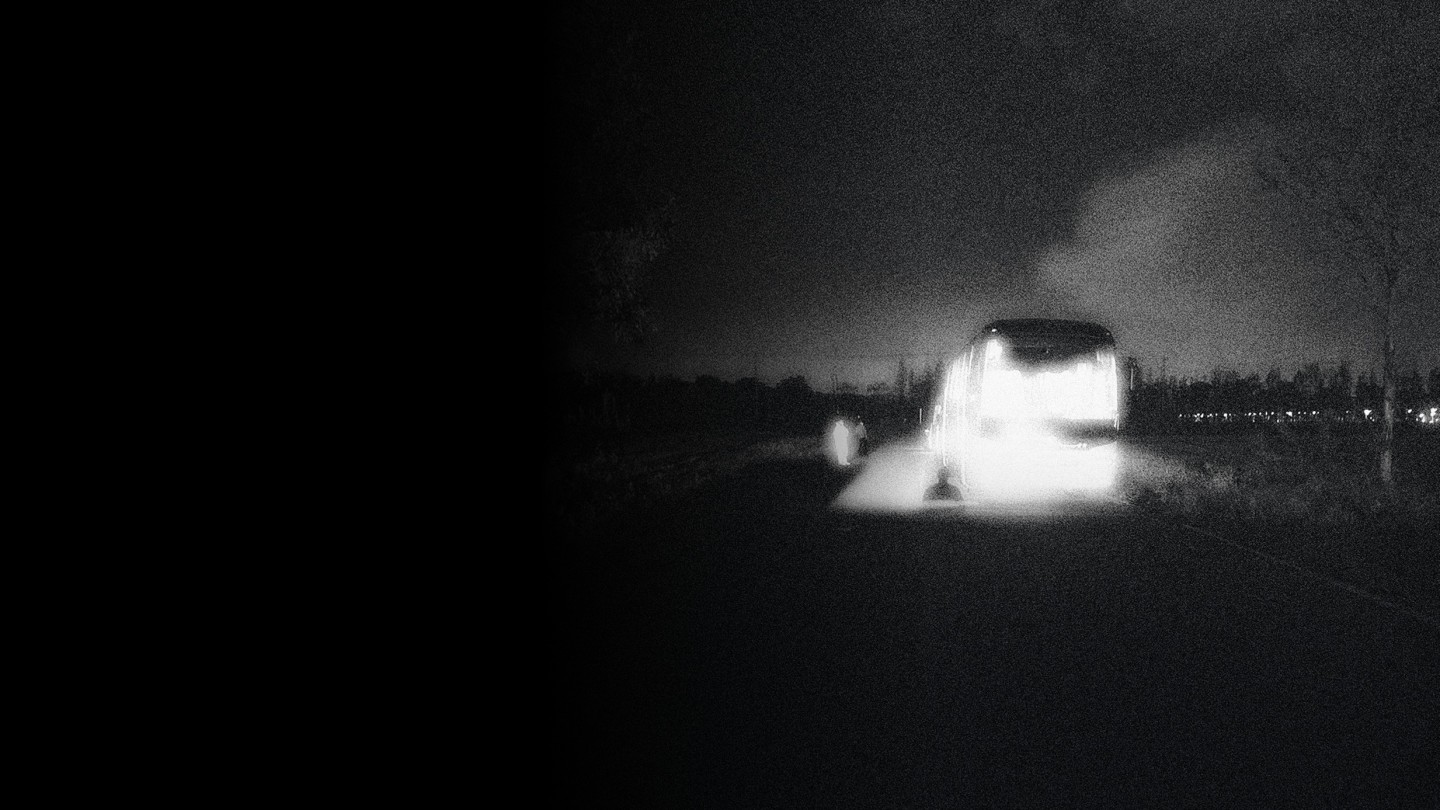
Roula Khalaf, Editor of the FT, selects her favourite stories in this weekly newsletter.
The call came from a number I did not recognise.
“You need to quarantine,” a man on the other end of the line said in Mandarin. He was calling from the Shanghai Municipal Center for Disease Control and Prevention. “I’ll come and get you in about four or five hours.”
I dashed out of my hotel to stock up on crucial supplies. Based on advice from colleagues and my previous experience of quarantine in China, these included: tinned tuna, tea, biscuits, three types of vitamin, four varieties of Haribo sweets, Tupperware, a yoga mat, a towel, cleaning equipment, an extension cable, a large number of books, eye drops, a tray, a mug and a coaster with a painting of the countryside surrounding Bolton Abbey in North Yorkshire.
Four to five hours later, I received another phone call. This time it was a woman from the hotel’s staff. “You are a close contact,” she said. “You can’t go outside.”
“Am I the only close contact in the hotel?”
I was, she told me and added “the hotel is closed”, meaning locked down. I went to the door of my room and opened it. A member of staff was standing there. We both jumped.
“You can’t go outside,” she said, mid-jump.
“Will the staff be able to leave?” I asked apologetically.
“It’s OK. I’ve just started my shift,” she replied, smiling.
The men in hazmat suits arrived a little later. First, they administered a PCR test with the same rushed weariness of the man who had called me earlier. Then, one escorted me down the deserted hallway. We passed the lifts, which were blocked off and guarded, and took the staff elevator. Outside, the entrance was also cordoned off. A hotel with hundreds of rooms had been frozen for me alone. I was being “taken away”, as this process is commonly referred to in China these days.
In the empty street, a bus was idling. It was small, a vehicle for school trips or large families, maybe. We drove off. “Are we going to another hotel?” I asked one of the dozen or so passengers on board.
“It’s not a hotel,” he said.
“Tian a,” another passenger said. This expression, often translated as “Oh my God”, conveyed more of a “For goodness’ sake” in this case.
The mood in the bus was not fearful so much as detached. The pop music whining out of the radio was occasionally mauled by severe static. Nobody seemed to notice. It is a curious experience, as an adult, to be driven somewhere without having any idea of the destination. Our driver, enmeshed in a hazmat suit, spoke frantically on his phone with some distant authority. After an hour or so, his driving seemed to become more frantic too, and my mind flashed to recent news reports from Guizhou province in which a quarantine transport bus had crashed, killing 27 passengers. I fastened my seatbelt and repositioned my suitcase, which was blocking the aisle.
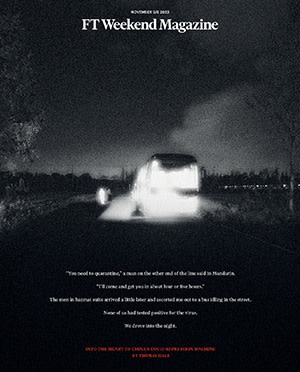
Eventually, we came to a stop on a small road in the middle of a field. The driver was instructed, over walkie-talkie, to keep going. But this was impossible because there were several full-sized coaches in front of us, and small crowds of people wandered around in the darkness. “I can’t drive,” he barked into his handset and proceeded to get out, lock the bus behind him and wander off into the night.
I wound down my window, just to see if climbing out might be viable. We were far into the countryside now, and it was surprisingly cold. Then a passenger who was also wearing a hazmat suit — the indiscriminate wearing of hazmat suits made it hard to discern who was in charge — leapt into the driver’s seat. He wasn’t trying to escape, just unlock the door. Outside, people smoked and milled around aimlessly.
“Where are you from?” one of the others asked me. His hazmat gear was rolled down around his waist, like a boiler suit. “The UK,” I said, and his eyes widened.
“They brought you here? With a foreign passport?”
The queue of buses slowly disappeared into what looked like a brightly lit gate at the end of the road. Cigarette smoke in the night air cast a silver pall over the fields. There was the sense of some vast structure behind the darkness. The placement of suitcases and bags inside the bus meant we were all in slightly uncomfortable positions, though one person had fallen asleep and was snoring loudly. Another played solitaire on his phone. We waited. None of us — not me, not the other passengers, not our driver — had tested positive for Covid-19.
Around 2am, our driver climbed back on board. The engine revved and the radio burst into life with a crackle. It was our turn. We continued deeper inside China’s quarantine apparatus, the kind of place that finds you, rather than the other way around. It is part of a system scarcely conceived of or understood by the outside world, one defined almost in opposition to it. It is a system that seeks to eliminate rather than cohabit with coronavirus, one in which an unknown number of people are detained. And it is a place foreigners might imagine, but where few have ever been.
Three weeks earlier, in the middle of Heathrow airport, the check-in queue for China Eastern Airlines was cordoned off, isolating passengers from their surroundings. “Now is not a good time to enter China,” a member of staff told me, just before I crossed the point of no return.
“It is easier to climb up to heaven than it is to leave the country”, it was sometimes said of the restrictions that governed pre-1990s communist China. Today, “it is easier to climb up to heaven than it is to return”. Technically, my climb began in early 2020, when I was appointed the FT’s Shanghai correspondent. I spent the next two years waiting in Hong Kong, unable to move to the mainland due to a heavily delayed visa. After a 12-hour flight, I arrived at Shanghai airport. Before entering the city itself, I would need to complete the mandatory 10-day quarantine that awaits anyone who doesn’t already have a home.
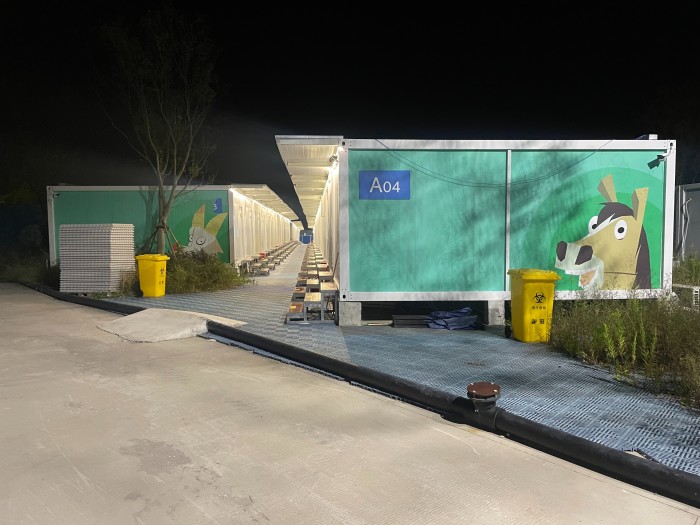
PCR testing in China is an almost daily ritual and testing booths are common on many street corners. They look vaguely like food stalls, except they’re larger and cube-shaped and a worker inside sits behind Plexiglas cut with two arm holes. They are merely the surface machinery of a vast monitoring system. China’s digital Covid pass resembles track-and-trace programmes elsewhere, except it’s mandatory and it works. Using Alipay or WeChat, the country’s two major apps, a QR code is linked to each person’s most recent test results. The code must be scanned to get in anywhere, thereby tracking your location. Green means you can enter; red means you have a problem.
After my first quarantine was complete, I moved to a hotel in the centre of the city while I searched for an apartment. But for my first few days of freedom, my QR code would not scan properly when entering buildings. Someone, somewhere, had spelt my first name Tnomab. (The letter “n” is next to the letter “h” on a QWERTY keyboard, which explains the first typo. The “b” was a mystery.) Until I could fix this, I had to negotiate to get anywhere. Otherwise, life in Shanghai seemed surprisingly normal, any trauma from a two-month lockdown in the spring hard to detect. The city’s glistening malls were well stocked. I ventured to a bar on Nanjing Road one evening, where I negotiated particularly hard to get in and where the whiskey flowed freely. One man told me he estimated that 90 per cent of Chinese people agreed with the government’s approach.
That approach, known as “zero Covid”, is one of maximal suppression of the virus. It employs contact tracing, constant testing, border quarantine and lockdowns in order to stop community transmission of the virus as soon as a case is detected. It is aggressive and could only really exist in the long-run in an autocratic society with the mechanisms for mass surveillance already in place. There is no end in sight to the policy, despite China’s vaccination rate of about 90 per cent. Communist party officials point to the country’s large elderly population, its uneven regional development and its insufficient medical resources. It is, above all, another kind of bureaucracy, with a vast workforce behind it.
A few days later, I received the first phone call. “Is this Tnomab?” a man asked. It took a long time to interpret this word, which exists in neither English nor Chinese. There had been a positive case at the bar. “Were you there?”
It might have been viable to deny that I was Tnomab, but Tnomab and I shared the same passport number. I didn’t have to quarantine, the man told me, but I should lay low. The odds were unfortunate, given there had been only 18 cases in Shanghai that day. Moreover, it was not clear if the exposure had even occurred on the evening I’d been there. The next day, the authorities called again to tell me they were on their way. I attempted to negotiate, but have not mastered doing so with someone who says they have no power over the outcome.
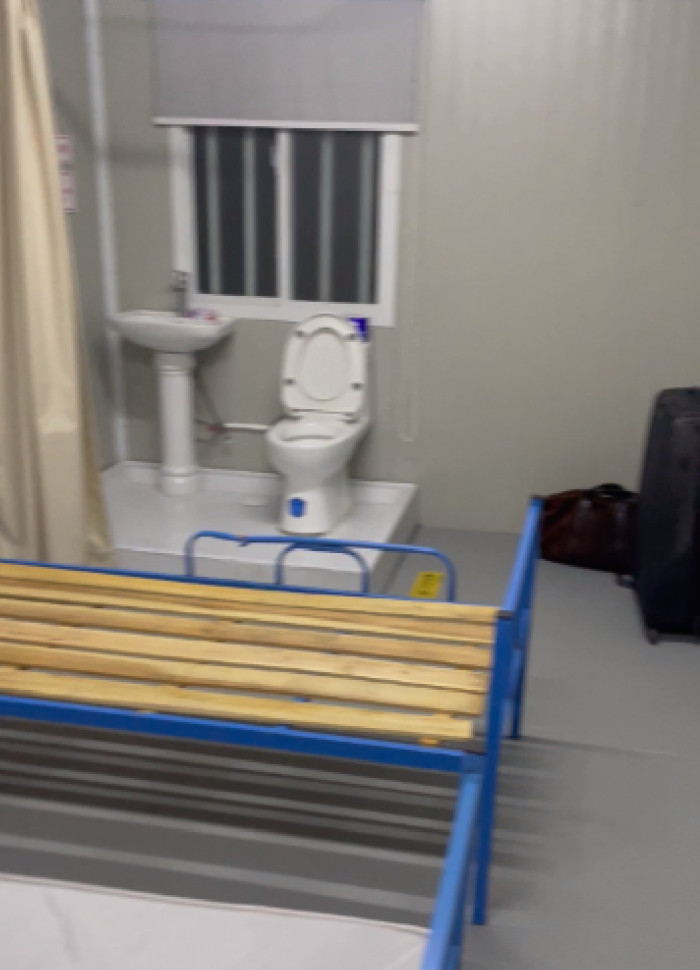
When the bus finally reached its destination many hours later, we quietly disembarked. Each of us was asked to confirm our presence on the “name list”, a bureaucratic concept as ancient as the green QR code is modern. In the darkness, there they were on the page, the only alphabetic letters in a sea of Chinese characters: Tnomab William Hale.
We were each assigned a room number. Another arrival, who I will refer to as Resident 1, walked alongside me toward detention. He gestured at three rows of wires above the blue fences that marked the perimeter, not quite barbed wire, but not far off. He shook his head, almost in laughter, and for a moment, amid the tiredness, I felt a welcome sense of camaraderie.
The sight of our quarters snapped us awake. The facility consisted of neat rows of what might be described as cabins, each one a shipping container-like box, sitting on short stilts above the ground. On the side of some of the rows, a large smiling animal had been painted, like a mural on a temporary school built after a natural disaster. It was hard to tell how many cabins there were in all. Fluorescent outdoor lighting flickered above, and a camera was positioned with a view of every door. Neither was ever turned off.
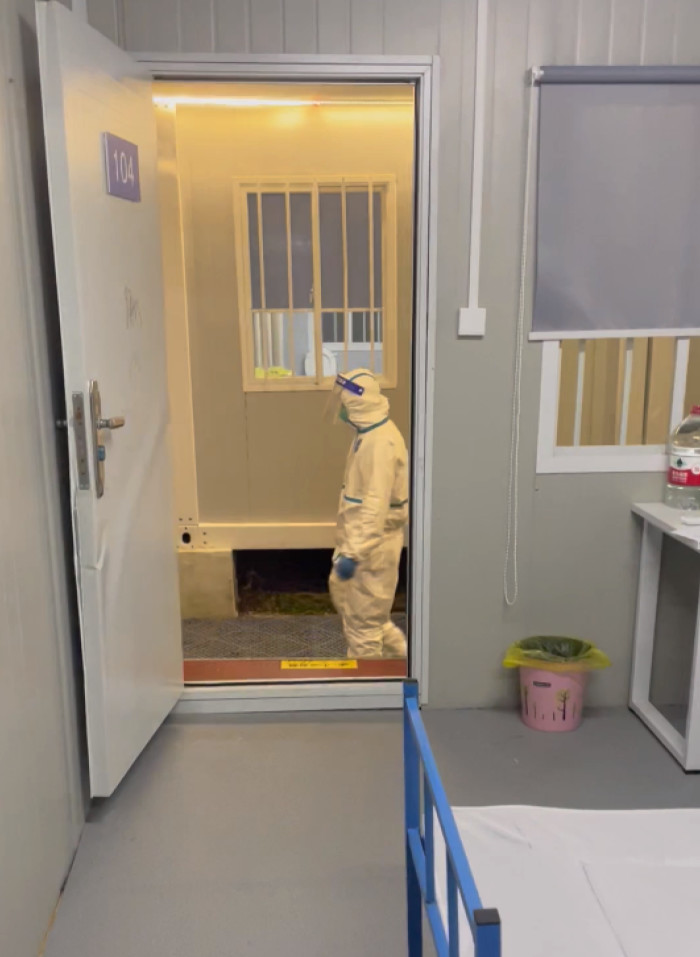
Most of us hovered in our doorways, taking in our new surroundings. “There’s no hot water,” someone shouted. Somewhere a woman wailed, and it occurred to me there were no children here. “She’s got no food,” Resident 1 explained. A hazmat-suited worker arrived to hand out instant noodles.
Inside my 196-sq-ft cabin there were two single beds, a kettle, an air-conditioning unit, a desk, a chair, a bowl, two small cloths, one bar of soap, an unopened duvet, a small pillow, a toothbrush, one tube of toothpaste and a roll-up mattress roughly the thickness of an oven glove. The floor was covered in dust and grime. The whole place shook when you walked around, which I soon stopped noticing. The window was barred, though you could still lean out. There was no shower. When I checked the internet connection, it was 24 times faster than the internet in my Shanghai hotel.
“I had seen the videos,” one resident later told me, referring to footage of similar mass-quarantine facilities that had circulated on Douyin, China’s TikTok. But she said the reality was still hard to take. I had also seen the videos and, before arriving in China, had wondered if it would be possible to find one of these places. Now I wanted to get out. I approached a member of staff in a hazmat suit, and explained that I was a foreign journalist, hoping this would trigger my release.
“What do you mean?” the woman asked. It was not merely my accent which confused her; the premise of my question made no sense here.
In China, there are several kinds of quarantine. There is quarantine for arrivals, at hotels, which I had just completed. There is quarantine at home, often as the result of citywide lockdowns. There is quarantine for Covid patients, or hospital quarantine. Finally, there is close-contact quarantine, which sometimes uses the word fangcang, meaning “portacabin”. For close contacts, or mijie, an extensive auxiliary vocabulary has also sprung up. A cimijie is a close contact of a close contact. A shikongbansuizhe is a close contact based on more flexible definitions of space and time. As a joke, I asked a colleague how to say a close contact of a close contact of a close contact. “Yibanjiechuzhe,” she offered.
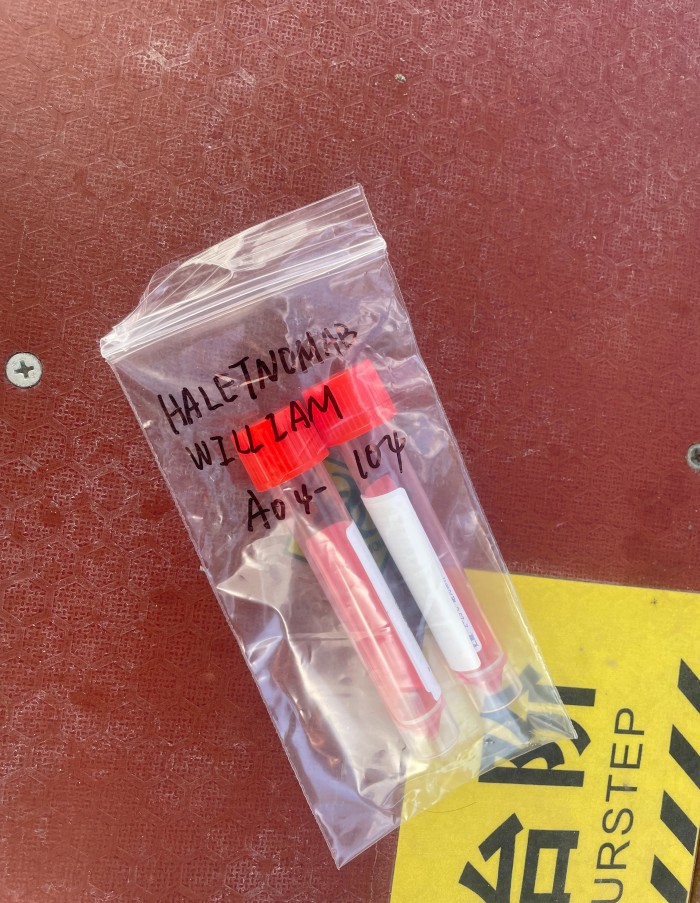
I was a mijie, and the facility was undeniably a fangcang quarantine centre. My phone told me it was located on an island north of Shanghai. On the first morning, I asked staff if anybody knew the facility’s full address. No one seemed sure. It turned out that they, too, had just arrived. All questions were referred to a phone number for “customer services”. But we were not really customers. For one thing, everything was free.
In the light of day, I saw the facility was clearly divided into two groups of people. The staff wore hazmat suits, the rest of us were now exclusively in plain clothes. The staff could go outside, whereas we could not. Workers in white hazmat suits have been widely referred to in China as da bai, which cannot be properly translated but uses the characters for “big” and “white”. One person told me it was the name of a Disney character; another said it was once used for the Michelin man.
One young man, who I will refer to as Worker 1, said he only knew our location as “P7”. It had just been built, he added, and I was the only foreigner here. Articles published in Chinese media in May reported a facility called P7 had been built five kilometres away from another, P5. It is unclear how many similar facilities exist in China.
It was initially impossible to discern who was who among the staff. I learnt the staff, like us, couldn’t leave the facility, nor could they receive deliveries. Later, one worker told me they were paid Rmb230 (£31.75) a day. Eventually, through the hazmat suits, masks and goggles, quirks of personality emerged, a particular timbre, a gait.
Worker 1, or at least I think it was him, sang old songs when handing out meals.
“Let’s hang out in Shanghai,” he suggested at one point.
“Where are you based?” I asked.
“It’s not fixed,” he replied. “I don’t have a stable job. After this month,” he added, “I’m not sure what I’ll do.”
The daily rhythm went as follows. Early in the morning, we awoke to a lawnmower-like noise, which was in fact an industrial-grade disinfectant machine spraying our windows and front steps. Meals were provided at 8am, noon and 5pm. Around 9am, two nurses in blue hazmat suits came by to administer PCR tests. Once, I asked if I would be taken somewhere else if I tested positive. “Of course you’ll be taken away!” one of the nurses said. “A new life!” she added in English.
I kept to a strict personal routine: language study, work, lunch, work, press-ups, playlists from the band Future Islands, online chess, reading or watching episodes of The Boys on Amazon Prime, in that order. This was interspersed with constant cleaning to keep the dust at bay. My faith in the power of routine was strengthened when I noticed that other residents had stopped collecting their breakfast, leaving them on the steps outside. Sound passed easily between the cabins, and I could hear people pacing around at night. I was lucky. At least it was my job to observe what was happening, rather than merely experience it.
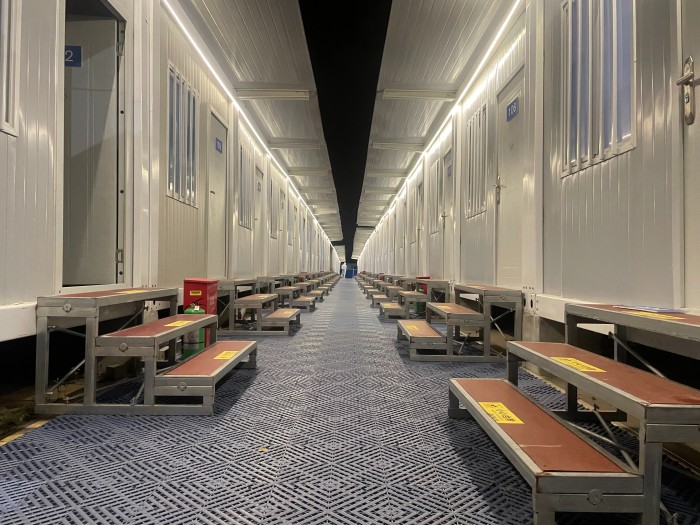
The bed was made of an iron frame and six planks of wood, and the mattress was so thin you had to lie completely flat. The bed frame, meanwhile, was impossible to lean against. I was reminded of the Roald Dahl book Matilda, a book I hadn’t thought about since I was about nine years old, in which the headmistress locks unruly children in a room in which they cannot get comfortable. Eventually, I found wrapping the duvet around the frame created a backrest.
Any discomfort was secondary to the psychological impact of uncertainty. Although I was told on arrival my stay would be seven days, it would in fact be 10. Customer service, in various long discussions, told me the “name list” of those being sent home was published daily and wasn’t available ahead of time. After a while, all my other problems dissolved and I thought only of getting out.
Although we were supposed to remain inside our cabins, it was sometimes possible to briefly wander out and, before the camera raised the alarm, trade information and occasionally goods with other residents. These moments were the best hope for any clarity. On one occasion, this yielded the miracle of instant coffee. On another, Resident 1 speculated that the cabins were only half-built and that we had been rushed into them because the quarantine hotels were full.
He told me that China’s young and old were divided because the latter could not access the foreign internet and see how the rest of the world has handled the pandemic. They lived in a parallel world, he said, but he could not bear the loss of freedom. I was also in a parallel world, the stakes of which I could not quite discern. The more I observed, the more I became numb to the experience.
The facility was bordered by tall trees and, late in the afternoon, when the sun set through them, you could open your door and let the light wash in. For a moment the whole place was possessed by the magnificent simplicity of the countryside. One day, around this time, I got into a conversation with three female members of staff who often gathered to chat within range of my porch. Their perception of the place in which we were imprisoned, and in which they worked long hours, was radically different to my own. It was fine, they said. You have your computer.
“China’s first- and second-tier cities, and third-, fourth- and fifth-tier cities, high-income, middle-class and bottom-tier cities, are also parallel worlds,” Resident 1 later told me.
The term da bai has taken on a darker resonance in the context of China’s class system. It is loosely bound up with the traumatic memory of the Cultural Revolution, in which ordinary people, many of them students, became “red guards” and were encouraged to upend the class order. Those with wealth or authority suddenly found the shoe was on the other foot. A Chinese saying goes: “Those who wear grass shoes are not afraid of those who wear leather shoes.” In recent months, the expression “white guards” has sometimes been used online, invoking the red guards of the past.
My conversation with the three women continued. Their sense that what was happening at P7 was normal was strangely persuasive. It was as though the bureaucracy, rather than the virus, was the natural phenomenon, one that thrived in the spaces between, rather than within, human beings. Perhaps I had misjudged everything. This was nothing like prison.
“Are you afraid of Covid-19?” I asked.
“Yes,” they said. “Anyway, if you test positive,” one added, “it’s hard to find work.”
“How old are you? Forty?” one asked.
“I’m 33,” I said.
“So young!” she said. “My son is a similar age.”
“Don’t you miss home here?” I asked.
They hesitated to respond. “It’s a job,” one eventually said.
“I know,” I said. “But don’t you miss home?”
“Of course I miss it.”
It is easier to climb up to heaven than to discern the inner workings of the name lists in P7. In order to get your name on the one that allows you to leave, you need to be on the so-called double test list a day earlier. If you are, nurses take a sample from your nose and mouth and then do the same for the other nostril. I lobbied extensively to be on this list, but nothing could be confirmed until the day itself.
When the nurses came, they also tested the floor, my bag, my mobile phone and the remote control for the air-conditioning unit. All of them, like the dozen or so tests I had taken in the previous two weeks, were negative. Eventually, my code turned green.
As my departure neared, I put on my shoes for the first time in a while. They were made of leather. On the local news, another facility was being built near Shanghai, this one for people who actually had Covid. On the international news, China’s 20th party congress, which began after I arrived, was nearing its conclusion. I asked Worker 1 if he had decided what he would do next. He was working there longer, he told me. Forty days: a true quarantine. When I went to shake Resident 1’s hand, it was the closest I had come to another person, other than PCR tests.
Before boarding the coach, I was handed a certificate. It was as though I, Tnomab William Hale, had just completed an examination, or, at least, received another education. The bus was full. There was no radio; everyone was playing music out loud on their phone, which was soon drowned out by the rush of air from the open windows. I thought the journey would end with a spectacular return of the city’s skyscrapers. But I fell asleep, and when I woke up, barely noticed them.
Back in my hotel, the hot water was hot and the mattress soft. The number on the scales in the bathroom was lower. It was the right time for a celebratory meal. But any restaurant would require me to scan my QR code, risking a repeat of the whole affair.
I spent some time pacing back and forth in the street, struggling to decide what to do. As I passed throngs of people in bars and restaurants, it occurred to me you’d have to be mad to wear the risks of freedom so lightly. They were living in a parallel world.
I approached a steak restaurant and asked if I needed to swipe the code to order takeaway. When they said no, I felt a great rush of relief. Then I saw myself: a man — I’ll call him Tnomab — a quarter of an inch under six feet tall, hair no longer blonde but not yet grey, with a moustache and 10 days of stubble. As he reached for his phone, his movement was both hurried and weary, as though he would pay any price.
Thomas Hale is the FT’s Shanghai correspondent
Follow @FTMag on Twitter to find out about our latest stories first
Letter in response to this article:
With Covid, did China get exactly what it wished for? / From Eric Chalker Tonbridge, Kent, UK
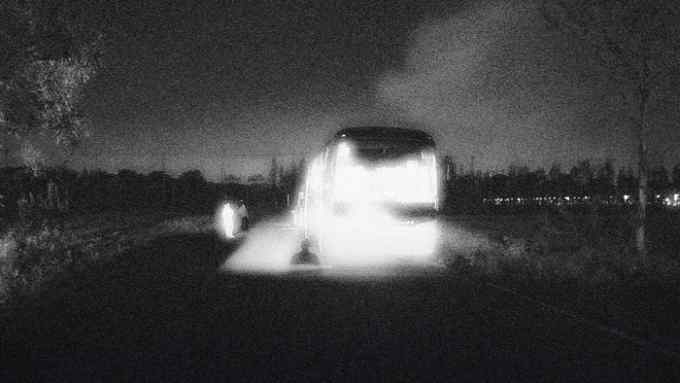
Comments